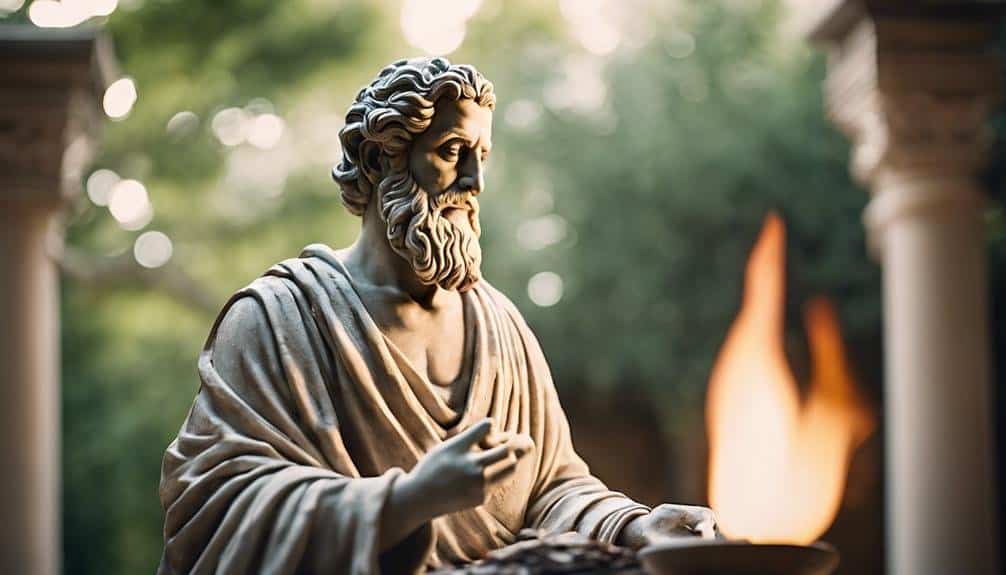Stoicism and the Stoics: Exploring the Lives and Legacies of Prominent Practitioners
Explore the impactful lives and philosophies of Stoic luminaries like Marcus Aurelius, Seneca, and Epictetus. Marcus Aurelius drew wisdom from mentors like Junius Rusticus and Epictetus. Seneca preached virtue, resilience, and self-examination; Epictetus emphasized internal freedom and acceptance. Stoicism left an indelible mark on Roman society, shaping politics, ethics, and education. Daily Stoic practices like meditation and journaling enhance resilience and self-awareness. Stoic literature promotes reason, virtue, and acceptance of nature's order, guiding one to virtuous living and inner peace. Uncover how Stoicism offers timeless principles for dealing with life's challenges with strength and wisdom.
Key Takeaways
- Marcus Aurelius, Seneca, and Epictetus are key Stoic figures influencing philosophy.
- Stoicism shaped Roman society, politics, education, and ethics.
- Daily Stoic practices like meditation, journaling, and reflection cultivate resilience.
- Stoic literature emphasizes reason, virtue, and acceptance of the natural order.
- Stoicism offers timeless wisdom for virtuous living and inner peace.
Early Life of Marcus Aurelius
During his formative years, Marcus Aurelius, the renowned Stoic philosopher and Roman Emperor, faced numerous challenges that shaped his character and philosophical outlook. Born into a prominent family, Marcus was exposed to Stoic principles from a young age. His early influences, particularly his tutor Junius Rusticus, played an important role in fostering his philosophical development. Rusticus introduced Marcus to the works of Epictetus, a former slave turned Stoic philosopher, whose teachings greatly resonated with the young Marcus.
As Marcus matured, he explored deeper into Stoic philosophy, drawing inspiration from the writings of Seneca and Epictetus. These early encounters with Stoic thought laid the foundation for Marcus Aurelius's own philosophical beliefs, emphasizing virtues such as wisdom, courage, justice, and temperance. Through introspection and contemplation, Marcus honed his understanding of Stoicism, ultimately shaping his reign as Emperor and leaving a lasting legacy as one of the most revered Stoic philosophers in history.
Seneca's Stoic Philosophy
Marcus Aurelius's exploration of Stoic philosophy led him to investigate the teachings of Seneca, a prominent Stoic philosopher whose insights greatly influenced Marcus's own philosophical beliefs and practices. Seneca's wisdom encompassed a wide array of Stoic principles, offering guidance on how to navigate life's challenges with resilience and virtue.
- On Virtue: Seneca emphasized the importance of cultivating virtue as the highest good, believing that true happiness stems from living in accordance with reason and moral excellence.
- On Adversity: Seneca's teachings on adversity encouraged individuals to embrace challenges as opportunities for growth, advocating for a mindset that views difficulties as chances to demonstrate strength and character.
- On Tranquility: Seneca promoted inner tranquility through acceptance of the present moment and the realization that external events are beyond our control, urging practitioners to find peace within themselves.
- On Self-Reflection: Seneca underscored the significance of self-reflection as a means to achieve self-improvement, encouraging individuals to examine their thoughts and actions critically to align themselves with Stoic virtues.
Epictetus and The Discourses
Let's examine the Stoic teachings of Epictetus and the profound impact his Discourses have had on Stoic philosophy.
By exploring Epictetus' insights and principles, we can grasp the essence of his philosophical outlook on life and virtue.
The Discourses offer valuable wisdom on how to navigate challenges, cultivate resilience, and attain inner tranquility.
Epictetus' Stoic Teachings
Epictetus, a prominent Stoic philosopher, imparted his profound teachings on Stoicism through his renowned work, The Discourses. When delving into Epictetus' Stoic principles, you encounter a world of wisdom that can reshape your perspective:
- Internal Freedom: Epictetus emphasized the importance of focusing on what we can control – our thoughts and actions.
- Acceptance of Fate: He taught that accepting events beyond our control with grace leads to tranquility.
- Virtue as the Highest Good: Epictetus believed that living a virtuous life was the key to true happiness.
- Endurance and Resilience: Through his quotes, he encouraged the development of inner strength to endure life's challenges.
Impact of Discourses
The impact of The Discourses by Epictetus on modern Stoic philosophy is profound, shaping individuals' perspectives on internal freedom and resilience. Epictetus' philosophical reflections, as captured in The Discourses, explore the core tenets of Stoicism, emphasizing the importance of virtue, acceptance of the present moment, and the distinction between what's within our control and what's not.
Through his teachings, Epictetus encourages individuals to cultivate a mindset that prioritizes rationality, self-discipline, and the development of inner strength. The influence of his Stoic discourses resonates with contemporary audiences, offering timeless wisdom that continues to inspire individuals to navigate life's challenges with equanimity and a focus on personal growth.
Stoicism in Roman Society
Stoicism permeated various aspects of Roman society, shaping the attitudes and behaviors of individuals across different social strata. Roman Stoicism emphasized the cultivation of Stoic virtues such as wisdom, courage, justice, and temperance. These principles influenced the following aspects of Roman society:
- Political Life: Stoicism played a significant role in shaping the political landscape of Rome. Many prominent Roman leaders, such as Emperor Marcus Aurelius, were adherents of Stoic philosophy. Their governance was often guided by Stoic virtues, promoting justice and the well-being of the people.
- Military: Stoic teachings were deeply ingrained in the Roman military ethos. Soldiers were encouraged to embody courage in the face of adversity, temperance in their actions, and wisdom in their decision-making processes.
- Social Interactions: Stoicism influenced social norms by promoting the idea of treating others with fairness and respect. The emphasis on justice and benevolence fostered a sense of community and cooperation among Romans.
- Education: Stoic virtues were integrated into educational practices, emphasizing the importance of moral development alongside intellectual growth. This holistic approach aimed to produce well-rounded individuals capable of contributing positively to society.
Stoic Practices and Exercises
As you begin to delve into exploring Stoic Practices and Exercises, you'll encounter a range of daily practices and mindfulness exercises that the Stoics advocated.
These practices aim to cultivate virtues, promote self-discipline, and enhance resilience in the face of adversity.
Stoic Daily Practices
Engage in Stoic daily practices to cultivate resilience and wisdom in your daily life. Stoicism offers practical techniques that can be integrated into your routine to enhance your mental strength and emotional well-being.
Consider incorporating the following practices into your daily life:
- Stoic Meditation: Begin your day with a few moments of introspection, focusing on virtues like courage and wisdom.
- Stoic Journaling: Reflect on your thoughts and actions, identifying areas for improvement and expressing gratitude.
- Contemplation of Impermanence: Remind yourself of the transient nature of things, fostering a sense of detachment from material possessions.
- Evening Review: Before bed, review your day, acknowledging both successes and areas where you could have acted more virtuously.
Stoic Mindfulness Exercises
Incorporate stoic mindfulness exercises into your daily routine to enhance self-awareness and cultivate a deeper sense of inner peace and resilience.
Start by practicing Stoic breathing techniques, focusing on slow, intentional breaths to center yourself in the present moment. Mindfulness practices can help you observe your thoughts and emotions without judgment, fostering a sense of clarity and calmness.
Stoic journaling is another powerful exercise where you can reflect on your daily experiences, challenges, and responses. Engaging in daily reflections allows you to identify areas for personal growth and improvement, aligning your actions with Stoic principles.
Legacy of Stoic Literature
Stoic literature leaves a profound mark on philosophical thought, shaping modern perspectives with its timeless wisdom and practical guidance. The legacy of Stoic literature endures through the ages, offering profound insights into the human experience and providing a roadmap for living a virtuous life.
- Universal Principles: Stoic literature elucidates universal philosophical principles that transcend time and culture, emphasizing the importance of reason, virtue, and acceptance of the natural order.
- Practical Wisdom: Stoic texts provide practical guidance on how to navigate life's challenges with resilience, courage, and integrity, offering strategies for achieving inner peace and tranquility.
- Ethical Framework: Stoic literature presents a robust ethical framework that encourages individuals to cultivate moral character, exercise self-control, and prioritize the common good over personal desires.
- Literary Influence: The works of Stoic philosophers have had a lasting impact on literature, inspiring writers, poets, and thinkers across generations to explore themes of resilience, fate, and the human condition.
Stoicism's Influence Today
Stoicism's enduring relevance in contemporary society is evident through its impact on individuals' strategies for tackling challenges and cultivating resilience. The philosophy's emphasis on focusing on what's within one's control and accepting what isn't has gained traction in the domains of mental health and business leadership.
In the context of mental health, Stoicism offers a practical framework for managing emotions and coping with adversity. By promoting rationality and teaching individuals to detach themselves from destructive emotions, Stoicism provides tools for maintaining mental well-being in the face of life's uncertainties.
Moreover, Stoic principles have found resonance in the field of business leadership. The philosophy's emphasis on resilience, self-discipline, and adaptability aligns well with the demands of modern leadership roles. By incorporating Stoic practices such as understanding the nature of change, maintaining a focus on long-term goals, and embracing challenges as opportunities for growth, individuals in leadership positions can enhance their decision-making and inspire their teams to navigate complexities effectively.
Famous Stoic Quotes
Famous Stoic quotes encapsulate timeless wisdom and offer invaluable insights into maneuvering life's challenges with fortitude and wisdom. Throughout history, Stoic philosophers have provided profound reflections on human nature and the universe, inspiring many to cultivate inner strength and resilience. Here are four notable Stoic quotes that exemplify Stoic wisdom and resilience:
- 'Happiness and freedom begin with a clear understanding of one principle: Some things are within our control, and some things are not.' – Epictetus
- 'The happiness of your life depends upon the quality of your thoughts.' – Marcus Aurelius
- 'The best revenge isn't to be like your enemy.' – Marcus Aurelius
- 'Waste no more time arguing about what a good man should be. Be one.' – Marcus Aurelius
These quotes emphasize the Stoic emphasis on focusing on what's within our control, cultivating positive thoughts, refraining from retaliation, and embodying virtue rather than merely discussing it. Such teachings continue to resonate today, guiding individuals towards a more balanced and fulfilling life.
Modern Applications of Stoicism
Exploring contemporary applications of Stoic principles reveals their enduring relevance in managing the complexities of modern life with resilience and wisdom. Stoic resilience, a core tenet of Stoicism, emphasizes the importance of facing adversity with a calm and rational mindset. This concept is particularly valuable in today's fast-paced and unpredictable world, where challenges abound.
| Modern Stoic Practices | Benefits |
|---|---|
| Practicing Mindfulness | Increases self-awareness and emotional regulation |
| Embracing Virtue Ethics | Promotes moral clarity and integrity in decision-making |
| Accepting the Present Moment | Reduces anxiety and fosters contentment |
| Cultivating Inner Strength | Enhances mental toughness and perseverance |
Modern stoic practices, such as mindfulness, virtue ethics, acceptance of the present moment, and inner strength cultivation, offer individuals practical tools to navigate the complexities of modern life. By incorporating these principles into daily routines, individuals can enhance their well-being, build resilience in the face of challenges, and cultivate a sense of inner peace amidst external turmoil.
Conclusion
As you reflect on the lives and teachings of prominent Stoics, you're reminded of the enduring impact of their philosophy.
Just as the ancient Stoics found strength in the face of adversity, you too can draw inspiration from their wisdom and practices.
Embrace the stoic principles of virtue, resilience, and mindfulness in your own life, and let the timeless teachings of these great thinkers guide you towards a more balanced and fulfilling existence.








